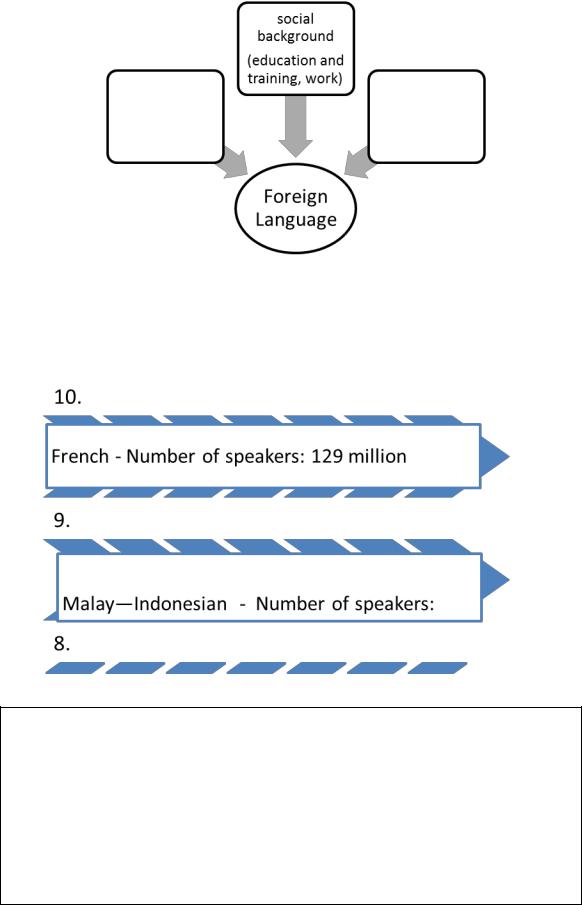
Angliyskiy
.pdf
change. Components are added and lost. Some move from place to place within the soil. And some components are totally changed, or transformed.
When humans build buildings and roads they change soils, often removing the surface soil and drastically changing the areas. When this change happens, soil formation starts to change. People who study disturbed soils map how these soils respond to human manipulation.
8. Read the text and complete the diagram.
9. Complete the sentences with the suitable words from the text.
1.Soils differ because of ___ and ___ they formed.
2.Five major factors interact to create different types of soils: climate, ___ and ___ influence the speed of chemical ___, which in turn help control how fast rocks weather and dead organisms decompose.
3.Soils develop faster in warm, moist ___ and slowest in cold or arid ones.
4.When humans build ___ and roads they change soils, often removing the ___ soil and drastically changing the areas.
5.People who study disturbed soils ___ how these soils respond to human ___.
10. Write 10 questions to the text.
111
History of Agriculture
The scale below provides an indication of how recent the phenomenon of farming is:
The world was formed ca 4, 600 million years ago.
Eukaryotic life forms: ca. 1,000 million years ago
First hominid life forms 4 million years ago (hunter gatherers)
First human farmers: about 12,000 years ago.
Global Agricultural Evolution: 1650 – 1850 AD
Modern Agricultural Evolution: 1950 - present
Vocabulary
−phenomenon [fɪ'nɔmɪnən] - Pl.- phenomena - феномен
−eukaryotic [juːˌkærɪ'ɔtɪk] - относящийся к эукариотам
−hominid [ˈhɒmɪnɪd] - гоминид отряда приматов класса млекопитающих
−ca от circa ['sɜːkə] - приблизительно, примерно, около
11.Draw sketchy the Agriculture History scales. QUICK CHECK
12.Complete the text with the words below.
Agriculture in General
Agriculture is the world‘s most important (1) ___. It provides us with almost all our (2) ___, supplies (3) ___ for two other basic human needs – (4) ___ and (5) ___. Food is most important farm
(6) ___. Some crops are used only to feed (7) ___. The main food crop is (8) ___ grains. The chief grains are barley, oats, wheat. The second group is (9) ___ crops. The leading crops are (10) ___, beets.
root |
food |
clothing |
industry |
cereal |
product |
materials |
shelter |
livestock |
potatoes |
|
|
112 |
|
|

|
III. SOCIETY & CULTURE |
UNIT 1 |
FOREIGN LANGUAGE |
|
|
Texts |
Communication in Foreign Language |
|
The Top 10 Languages Spoken in World |
|
English Language |
|
|
Grammar |
Passive Voice |
|
|
Self-Study |
The United Kingdom of Great Britain and |
|
Northern Ireland |
|
The Flag of the United Kingdom |
|
London |
|
The United States of America |
|
Flag of the United States |
|
Tests |
|
|
Quick Check |
Test |
|
|
Communication in Foreign
Language
Communication in foreign languages broadly shares the main skill dimensions as communication in the mother tongue: it is based on the ability to understand, express and interpret concepts, thoughts, feelings, facts and
opinions in both oral and written form (listening, speaking, reading and writing) in an appropriate range of societal and cultural contexts (in education and training, work, home and leisure) according to one's wants or needs.
Communication in foreign languages also calls for skills such as mediation and intercultural understanding. An individual's level of proficiency will vary between the four dimensions and between
113

the different languages, and according to that individual's social and cultural background, environment, needs and/or interests.
Vocabulary
foreign language ['fɔrɪn 'læŋgwɪʤ] - иностранный язык
broadly ['brɔːdlɪ] - широко
to share I [ʃeə] - делиться
dimension [daɪ'menʃ(ə)n] - сторона, аспект (жизни,
проблемы)
mother-tongue [tʌŋ] - родной язык
to express [ɪk'spres ] - выражать, высказывать
to interpret [ɪn'tɜːprɪt] - объяснять, интерпретировать
thought [θɔːt] - мысль, мышление, размышление
oral ['ɔːr(ə)l] - устный, словесный
appropriate range [ə'prəuprɪət reɪnʤ] - соответствующий уровень
leisure ['leʒə] - досуг, свободное время
according to - в соответствии с, согласно, по
mediation [ˌmiːdɪ'eɪʃ(ə)n] - посредничество
intercultural - межкультурный
proficiency [prə'fɪʃ(ə)nsɪ] - умение
1. Read the text and complete the table.
FOREIGN LANGUAGE
Oral Form |
___ Form |
Listening
2. What does an individual's level of foreign language influence? Complete the diagram.
114

The Top 10 Languages Spoken in World 3. Read the texts and complete The Top 10.
Spanish [„spæniʃ] – Number of speakers: 392 million
Aside from all of those kids who take it in high school, Spanish is spoken in just about every South American and Central American country, not to mention Spain, Cuba, and the U.S. There is a particular interest in Spanish in the U.S., as many English words are borrowed from the language, including: tornado, patio.
115

French [frentʃ] – Number of speakers: 129 million
Often called the most romantic language in the world, French is spoken in tons of countries, including Belgium, Canada, Rwanda,
Cameroon, and Haiti and France too. We‘re actually very lucky that French is so popular, because without it, we might have been stuck with Dutch Toast and Dutch kissing.
Russian [„rʌʃ(ə)n] – Number of speakers: 277 million
One of the six languages in the UN, Russian is spoken not only in the Mother Country, but also in Belarus, Kazakhstan, and the U.S.
English [iŋgliʃ] – Number of speakers: 508 million
While English doesn‘t have the most speakers, it is the official language of more countries than any other language. Its speakers hail from all around the world, including the U.S., Australia, England, Zimbabwe, the Caribbean, Hong Kong, South Africa, and Canada.
Malay−Indonesian [mə‟lei indəu‟niziən] – Number of speakers: 159 million
Malay-Indonesian is spoken – surprise – in Malaysia and Indonesia. Indonesia is a fascinating place; a nation made up of over 13,000 islands it is the sixth most populated country in the world. Malaysia borders on two of the larger parts of Indonesia, and is mostly known for its capital city of Kuala Lumpur.
Arabic [„ærəbik] – Number of speakers: 246 million
Arabic, one of the world‘s oldest languages, is spoken in the
Middle East, with speakers found in countries such as Saudi Arabia, Kuwait, Iraq, Syria, Jordan, Lebanon, and Egypt. Furthermore, because Arabic is the language of the Koran, millions of Moslems in other countries speak Arabic as well. So many people have a working knowledge of Arabic, in fact, that in 1974 it was made the sixth official language of the United Nations.
116

Bengali [beŋ‟gɔ:li] – Number of speakers: 211 million
In Bangladesh, a country of 120+ million people, just about everybody speaks Bengali. And because Bangladesh is virtually surrounded by India (where the population is growing so fast, just breathing the air can get you pregnant), the number of Bengali speakers in the world is much higher than most people would expect.
Hindustani [hindu‟sta:ni] – Number of speakers: 497 million
Hindustani is the primary language of India‘s crowded population, and it encompasses a huge number of dialects. The film industry in India is the most prolific in the world, making thousands of action/romance/ musicals every year.
Mandarin [mænd(ə)rin] – Number of speakers: 1 billion+
Surprise, surprise, the most widely spoken language on the planet is based in the most populated country on the planet, China. Beating second-place English by a 2 to 1 ratio, but don‘t let that lull you into thinking that Mandarin is easy to learn. Speaking Mandarin can be really tough, because each word can be pronounced in four ways (or ―tones‖), and a beginner will invariably have trouble distinguishing one tone from another. But if over a billion people could do it, so could you.
Portuguese [pɔ:tʃə‟gi:z] − Number of speakers: 191 million
Think of Portuguese as the little language that could. In the 12th Century, Portugal won its independence from Spain and expanded all over the world with the help of its famous explorers like Vasco da Gama and Prince Henry the Navigator. Because Portugal got in so early on the exploring game, the language established itself all over the world, especially in Brazil (where it‘s the national language), Macau, Angola, Venezuela, and Mozambique.
117
4. Try saying hello! Match.
To say “hello” in |
Say: |
|
|
|
|
1. |
French |
a. ―Bom dia‖ (bohn dee-ah) |
|
|
|
2. |
Malay- |
b. ―Al salaam a‘alaykum‖ (ahl sah-lahm ah |
Indonesian |
ah-lay-koom) |
|
|
|
|
3. |
Portuguese |
c. ―Zdravstvuite‖ (zdrast-vet- yah) |
|
|
|
4. |
Bengali |
d. ―Selamat pagi‖ (se-la-maht pa-gee) |
|
|
|
5. |
Arabic |
e. ―Bonjour‖ (bone-joor) |
|
|
|
6. |
Russian |
f. ―Namaste‖ (nah-mah-stay) |
|
|
|
7. |
Spanish |
g. ―What‘s up, Doc?‖ (watz-up-dok) |
|
|
|
8. |
Hindustani |
h. ―Ei Je‖ (eye-jay) |
|
|
|
9. |
English |
i. ―Ni hao‖ (nee haow) |
|
|
|
10. Mandarin |
j. ―Hola‖ (oh-la) |
|
|
|
|
Key: 1-e; 2-d; 3-a; 4-h; 5-b; 6-c; 7- j; 8-f; 9-g; 10-i
5. Read the text and write down the numbers with the information.
English Language
According to research by the British Council*, "English has official or special status in at least seventy-five countries with a total population of over two billion. English is spoken as a native language by around 375 million and as a second language by around 375 million speakers in the world. Speakers of English as a second language will soon outnumber those who speak it as a first language. Around 750 million people are believed to speak English as a foreign language. One out of four of the world's population speaks English to some level of competence. Demand from the other three-quarters is increasing."
*The British Council - Британский совет. Правительственная организация по развитию культурных связей с зарубежными странами.
118
6. Read the text and complete the diagram “What People Use English For”
The British Council says "English is the main language of books, newspapers, airports and air-traffic control, international business and academic conferences, science, technology, diplomacy, sport, international competitions, pop music and advertising.
Over two-thirds of the world's scientists read in English. Three quarters of the world's mail is written in
English. Eighty per cent of the world's electronically stored information is in English. Of the estimated forty million users of the Internet, some eighty per cent communicate in English, but this is expected to decrease to forty per cent as speakers of other languages get online.
7. Read the article and choose the best title.
a)English Language
b)The Growth and Expansion of English
c)American English
English is part of the Germanic branch of the Indo-European family of languages. By year 1000, the English language consisted of approximately 40 000 words. Nowadays, the number has grown to more than 500 000. If we calculate the average of words created per century, this comes to 46 000. A great number of words found in the English vocabulary was borrowed from Latin, French, Low German, and the Scandinavian languages. We also know that some periods were more fertile than others: invasions, contact with other cultures, inventions, technological progress, music, fashion are some of the factors which have helped to enrich the language.
British colonialism in the 19th century and American capitalism and technological progress in the 20th century were
119
undoubtedly the main causes for the spread of English throughout the world.
The USA has played a leading role in most domains for the last hundred years. At the end of the 19th century and first quarter of the 20th, it welcomed millions of European immigrants who had fled their countries ravaged by war, poverty or famine. This labor force strengthened American industries and development. The Hollywood film industry also attracted many foreign artists in quest of fame and fortune and the number of American films produced every year soon flooded the market.
8.Ask 10 Wh-questions to the text above.
9.Choose the correct answer.
1.The usual response to "How are you?" in English is: a) Fine, thank you.
b) Fine!
c) Terrible. My mother is ill; I earn too little money.
2.Typical informal leave-taking in English is:
a) Goodbye. |
b) See you. |
c) Take care. |
d) Good luck. |
3. When it is someone's birthday, it is usual to say:
a) Congratulations! |
b) Happy Birthday! |
c) Good Luck! |
d) I'm sorry. |
4. You have given your friend a special New Year's present. Your friend thanks you. You answer:
a) Don't mention it. |
b) Not at all. |
c) You're welcome. |
d) My pleasure. |
120
